The Intel Core i9-9980XE CPU Review: Refresh Until it Hertz
by Ian Cutress on November 13, 2018 9:00 AM ESTHEDT Performance: Web and Legacy Tests
While more the focus of low-end and small form factor systems, web-based benchmarks are notoriously difficult to standardize. Modern web browsers are frequently updated, with no recourse to disable those updates, and as such there is difficulty in keeping a common platform. The fast paced nature of browser development means that version numbers (and performance) can change from week to week. Despite this, web tests are often a good measure of user experience: a lot of what most office work is today revolves around web applications, particularly email and office apps, but also interfaces and development environments. Our web tests include some of the industry standard tests, as well as a few popular but older tests.
We have also included our legacy benchmarks in this section, representing a stack of older code for popular benchmarks.
All of our benchmark results can also be found in our benchmark engine, Bench.
WebXPRT 3: Modern Real-World Web Tasks, including AI
The company behind the XPRT test suites, Principled Technologies, has recently released the latest web-test, and rather than attach a year to the name have just called it ‘3’. This latest test (as we started the suite) has built upon and developed the ethos of previous tests: user interaction, office compute, graph generation, list sorting, HTML5, image manipulation, and even goes as far as some AI testing.
For our benchmark, we run the standard test which goes through the benchmark list seven times and provides a final result. We run this standard test four times, and take an average.
Users can access the WebXPRT test at http://principledtechnologies.com/benchmarkxprt/webxprt/
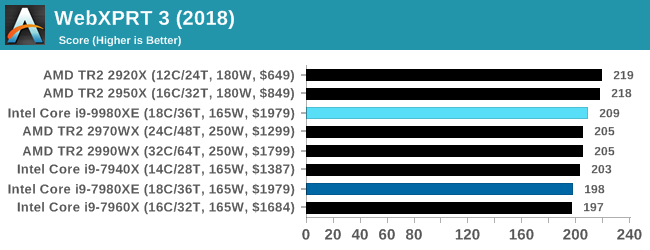
WebXPRT 2015: HTML5 and Javascript Web UX Testing
The older version of WebXPRT is the 2015 edition, which focuses on a slightly different set of web technologies and frameworks that are in use today. This is still a relevant test, especially for users interacting with not-the-latest web applications in the market, of which there are a lot. Web framework development is often very quick but with high turnover, meaning that frameworks are quickly developed, built-upon, used, and then developers move on to the next, and adjusting an application to a new framework is a difficult arduous task, especially with rapid development cycles. This leaves a lot of applications as ‘fixed-in-time’, and relevant to user experience for many years.
Similar to WebXPRT3, the main benchmark is a sectional run repeated seven times, with a final score. We repeat the whole thing four times, and average those final scores.
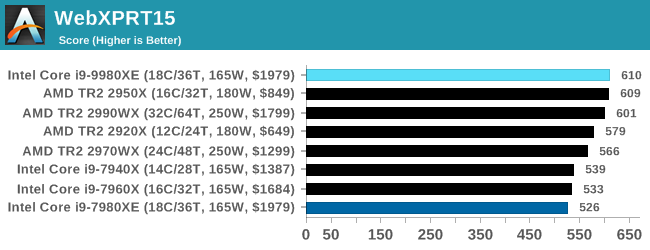
Speedometer 2: JavaScript Frameworks
Our newest web test is Speedometer 2, which is a accrued test over a series of javascript frameworks to do three simple things: built a list, enable each item in the list, and remove the list. All the frameworks implement the same visual cues, but obviously apply them from different coding angles.
Our test goes through the list of frameworks, and produces a final score indicative of ‘rpm’, one of the benchmarks internal metrics. We report this final score.
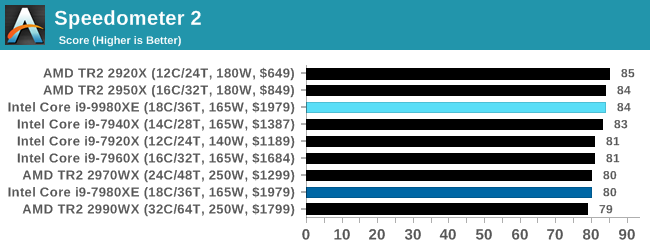
Google Octane 2.0: Core Web Compute
A popular web test for several years, but now no longer being updated, is Octane, developed by Google. Version 2.0 of the test performs the best part of two-dozen compute related tasks, such as regular expressions, cryptography, ray tracing, emulation, and Navier-Stokes physics calculations.
The test gives each sub-test a score and produces a geometric mean of the set as a final result. We run the full benchmark four times, and average the final results.
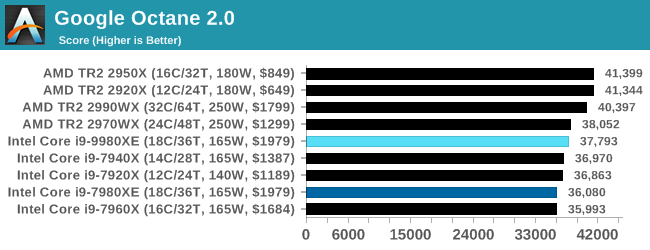
Mozilla Kraken 1.1: Core Web Compute
Even older than Octane is Kraken, this time developed by Mozilla. This is an older test that does similar computational mechanics, such as audio processing or image filtering. Kraken seems to produce a highly variable result depending on the browser version, as it is a test that is keenly optimized for.
The main benchmark runs through each of the sub-tests ten times and produces an average time to completion for each loop, given in milliseconds. We run the full benchmark four times and take an average of the time taken.
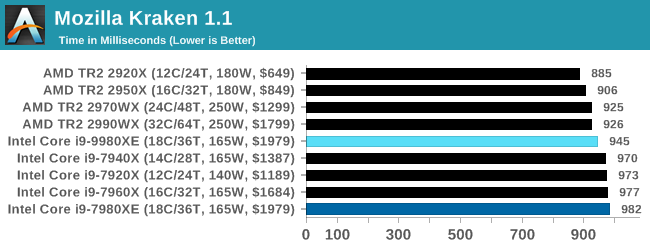
3DPM v1: Naïve Code Variant of 3DPM v2.1
The first legacy test in the suite is the first version of our 3DPM benchmark. This is the ultimate naïve version of the code, as if it was written by scientist with no knowledge of how computer hardware, compilers, or optimization works (which in fact, it was at the start). This represents a large body of scientific simulation out in the wild, where getting the answer is more important than it being fast (getting a result in 4 days is acceptable if it’s correct, rather than sending someone away for a year to learn to code and getting the result in 5 minutes).
In this version, the only real optimization was in the compiler flags (-O2, -fp:fast), compiling it in release mode, and enabling OpenMP in the main compute loops. The loops were not configured for function size, and one of the key slowdowns is false sharing in the cache. It also has long dependency chains based on the random number generation, which leads to relatively poor performance on specific compute microarchitectures.
3DPM v1 can be downloaded with our 3DPM v2 code here: 3DPMv2.1.rar (13.0 MB)
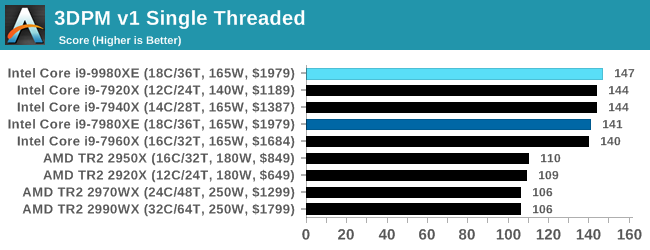
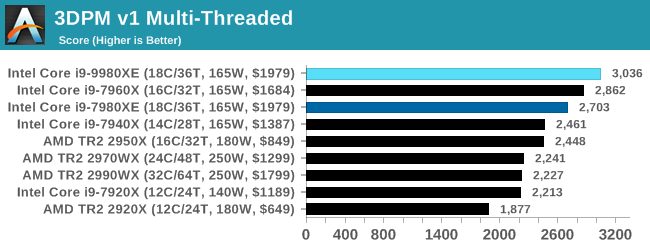
x264 HD 3.0: Older Transcode Test
This transcoding test is super old, and was used by Anand back in the day of Pentium 4 and Athlon II processors. Here a standardized 720p video is transcoded with a two-pass conversion, with the benchmark showing the frames-per-second of each pass. This benchmark is single-threaded, and between some micro-architectures we seem to actually hit an instructions-per-clock wall.
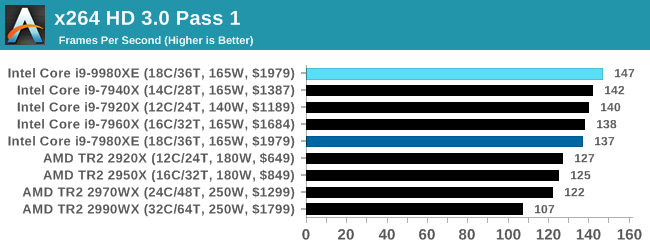
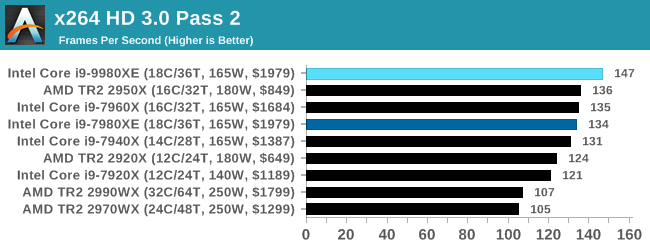










143 Comments
View All Comments
nexuspie - Tuesday, November 13, 2018 - link
You're so ghetto you're using a 2500k from 2011? Stop posting and get a job so you can afford an upgrade. I guess it proves that Intel makes good chips though if you can wait this long to upgrade.LordanSS - Tuesday, November 13, 2018 - link
Still rocking a 3770k. Not going to pay "Intel price" for 4-cores and just 20% more IPC than I have.Zen2, that'll be my swap.
Spunjji - Tuesday, November 13, 2018 - link
I seriously don't understand people who are so insecure about their choices that they need to mock random people on the internet for not overspending on their computer equipment. If your use case enables you to spend on the absolute best way past the point of diminishing returns, that's great for you! Be happy and maybe lay off the comment sections..?Kilnk - Tuesday, November 13, 2018 - link
No... all it really means is that for the first time in the history of computing, software demands have allowed computing power to reach the level of "good enough" for a lot of users. Also things are a lot more GPU dependant than they used to be. CPUs are less relevant.duploxxx - Tuesday, November 13, 2018 - link
It is quite obvious. From a general performance/price/power perspective the TR2 2950x is the one to get. Forget all the uber expensive Intel junk.qap - Tuesday, November 13, 2018 - link
I guess it depends on i9-9820X. And I have a feeling it would be similar story to 2990WX vs i9-9980XE - AMD scoring in some benchmarks while intel keeping victory in other.Those who matter (actual buyers) will look at bench that matters to them while fans would be squealing that this or that benchmark is more important and therefore their favorite CPU is the best.
eva02langley - Tuesday, November 13, 2018 - link
I would honestly get an EPYC platform over the TR 32 cores. However, at this point, you have a really particular workload that requires such capabilities.It all depends on your needs, but true, Intel is not competitive at their price tags.
nexuspie - Tuesday, November 13, 2018 - link
These benchmarks show that the 9980's 18 cores often BEAT the 2990wx's 32 cores. AMD cores are garbage.Targon - Tuesday, November 13, 2018 - link
In what world are AMD cores garbage when they are more than competitive enough to push Intel into releasing the first significant changes in six years? Zen2 cores are also here(with the new Epyc chips), and Ryzen 3rd generation will be launching within the next five months or so, which WILL have a higher IPC than Intel at that point.twtech - Thursday, November 15, 2018 - link
The upgrade AMD really needs at this point is a software one - from Microsoft. The 2990WX performs pretty well when using Linux, but it struggles with most workloads in Windows. I hope that Zen 2's chiplets will do a little better in terms of memory access.